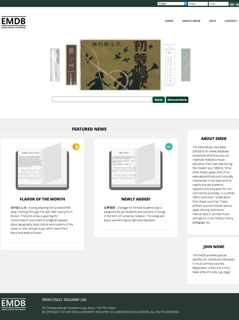The following is by Hyun Kyung Chae, co-director of RISM South Korea:
The Ewha Music Research Institute (EMRI) recently completed a 3-year project to establish a database of East Asia’s Educational Music Documents in October 2014. The result, Ewha Music Data Base (EMDB), now showcases the EMRI’s work of collecting and digitizing music education materials of East Asia: over 12,000 items of various types of music materials are listed. Its website (eMUSICdb.info) has been open to the public since November 1, 2014.
Users can browse and search the EMDB’s contents either by a simple search (using any keywords) or an advanced search (using Boolean functions) in four languages: Korean, Chinese, Japanese, and English. The search results will then be displayed and users can further limit the results by category, author, source location, or publication year. Users can view and compare the results of the sources from all three East Asian countries, if applicable. Another unique feature, which is patented, is that users can use incipits search by typing in the first five (5) alphabet letters using movable do solmization. A result screen will display the scores with their relevant contents and lyrics if they are available.
We hope the database will become one of the new and powerful research tools in providing much needed materials and serves as the foundation of a unified primary source repository for modern music of East Asia.
- See more at: http://www.rism.info/en/home/newsdetails/article/2/introducing-of-the-ew...
The following is by Hyun Kyung Chae, co-director of RISM South Korea:
The Ewha Music Research Institute (EMRI) recently completed a 3-year project to establish a database of East Asia’s Educational Music Documents in October 2014. The result, Ewha Music Data Base (EMDB), now showcases the EMRI’s work of collecting and digitizing music education materials of East Asia: over 12,000 items of various types of music materials are listed. Its website (eMUSICdb.info) has been open to the public since November 1, 2014.
Users can browse and search the EMDB’s contents either by a simple search (using any keywords) or an advanced search (using Boolean functions) in four languages: Korean, Chinese, Japanese, and English. The search results will then be displayed and users can further limit the results by category, author, source location, or publication year. Users can view and compare the results of the sources from all three East Asian countries, if applicable. Another unique feature, which is patented, is that users can use incipits search by typing in the first five (5) alphabet letters using movable do solmization. A result screen will display the scores with their relevant contents and lyrics if they are available.
We hope the database will become one of the new and powerful research tools in providing much needed materials and serves as the foundation of a unified primary source repository for modern music of East Asia.
- See more at: http://www.rism.info/en/home/newsdetails/article/2/introducing-of-the-ew...
The following has reached us from Hyun Kyung Chae, president of the South Korean IAML branch and director of RISM South Korea:
 The Ewha Music Research Institute (EMRI) recently completed a 3-year project to establish a database of East Asia’s Educational Music Documents in October 2014. The result, Ewha Music Data Base (EMDB), now showcases the EMRI’s work of collecting and digitizing music education materials of East Asia: over 12,000 items of various types of music materials are listed. Its website (eMUSICdb.info) has been open to the public since November 1, 2014.
The Ewha Music Research Institute (EMRI) recently completed a 3-year project to establish a database of East Asia’s Educational Music Documents in October 2014. The result, Ewha Music Data Base (EMDB), now showcases the EMRI’s work of collecting and digitizing music education materials of East Asia: over 12,000 items of various types of music materials are listed. Its website (eMUSICdb.info) has been open to the public since November 1, 2014.
Users can browse and search the EMDB’s contents either by a simple search (using any keywords) or an advanced search (using Boolean functions) in four languages: Korean, Chinese, Japanese, and English. The search results will then be displayed and users can further limit the results by category, author, source location, or publication year. Users can view and compare the results of the sources from all three East Asian countries, if applicable. Another unique feature, which is patented, is that users can use incipits search by typing in the first five (5) alphabet letters using movable do solmization. A result screen will display the scores with their relevant contents and lyrics if they are available.
We hope the database will become one of the new and powerful research tools in providing much needed materials and serves as the foundation of a unified primary source repository for modern music of East Asia.
- Facebook Like
- Share on Facebook
- Log in to post comments

